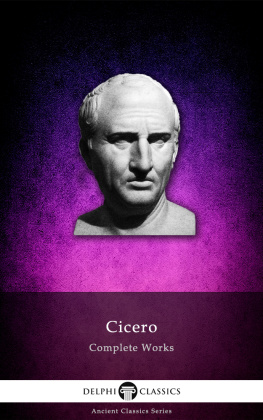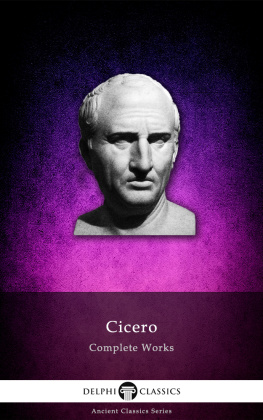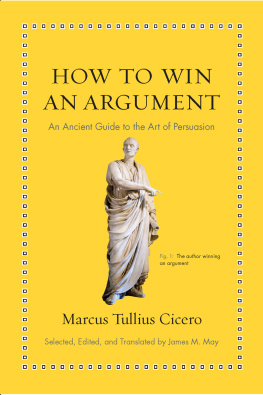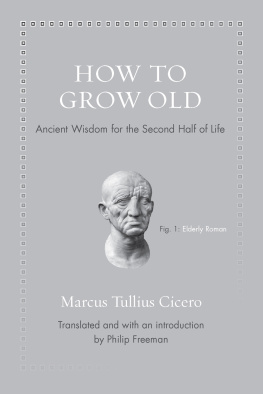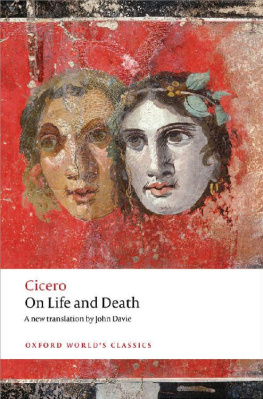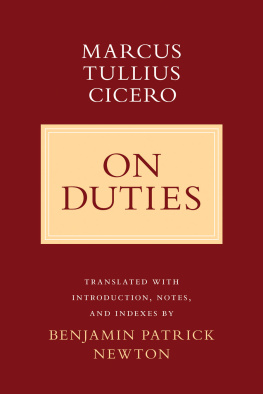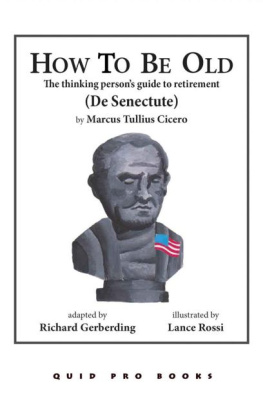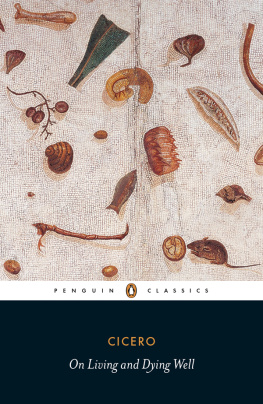Marcus Tullius Cicero - Murder Trials
Here you can read online Marcus Tullius Cicero - Murder Trials full text of the book (entire story) in english for free. Download pdf and epub, get meaning, cover and reviews about this ebook. year: 2010, publisher: Penguin Group USA, Inc., genre: Detective and thriller. Description of the work, (preface) as well as reviews are available. Best literature library LitArk.com created for fans of good reading and offers a wide selection of genres:
Romance novel
Science fiction
Adventure
Detective
Science
History
Home and family
Prose
Art
Politics
Computer
Non-fiction
Religion
Business
Children
Humor
Choose a favorite category and find really read worthwhile books. Enjoy immersion in the world of imagination, feel the emotions of the characters or learn something new for yourself, make an fascinating discovery.
- Book:Murder Trials
- Author:
- Publisher:Penguin Group USA, Inc.
- Genre:
- Year:2010
- Rating:4 / 5
- Favourites:Add to favourites
- Your mark:
- 80
- 1
- 2
- 3
- 4
- 5
Murder Trials: summary, description and annotation
We offer to read an annotation, description, summary or preface (depends on what the author of the book "Murder Trials" wrote himself). If you haven't found the necessary information about the book — write in the comments, we will try to find it.
Marcus Tullius Cicero: author's other books
Who wrote Murder Trials? Find out the surname, the name of the author of the book and a list of all author's works by series.
Murder Trials — read online for free the complete book (whole text) full work
Below is the text of the book, divided by pages. System saving the place of the last page read, allows you to conveniently read the book "Murder Trials" online for free, without having to search again every time where you left off. Put a bookmark, and you can go to the page where you finished reading at any time.
Font size:
Interval:
Bookmark:

MURDER TRIALS
ADVISOTY EDITOR: BETTY RADICE
MARCUS TULLIUS CICERO (10643 BC ), Roman orator and statesman, was born at Arpinum of a wealthy local family. He was taken to Rome for his education with the idea of a public career and by 70 BC he had established himself as the leading barrister in Rome. In the meantime his political career was well under way and he was elected praetor for the year 66. His ambitious nature enabled him to obtain those honours which would normally only have been conferred upon members of the Roman aristocracy, and he was duly elected consul for 63. One of the most permanent features of his political life was his attachment to Pompey. As a politician his notable quality was his consistent refusal to compromise: as a statesman his ideals were more honourable and unselfish than those of his contemporaries. Cicero was the greatest of the Roman orators, possessing a wide range of technique and an exceptional command of the Latin tongue. He followed the common practice of publishing his speeches, but he also produced a large number of works on the theory and practice of rhetoric, on religion, and on moral and political philosophy. He played a leading part in the development of the Latin hexameter. Perhaps the most interesting of his works is the collection of 900 letters published posthumously. These not only contain a first-hand account of social and political life in the upper classes at Rome, but also reflect the changing personal feelings of an emotional and sensitive man.
MICHAEL GRANT has been successively Chancellors Medallist and Fellow of Trinity College, Cambridge, Professor of Humanity at Edinburgh University, first Vice-chancellor of Khartoum University, President and Vice-chancellor of the Queens University of Belfast, and President of the Classical Association. Writings: translations of Ciceros On Government, On the Good Life, Selected Works, Selected Political Speeches and Murder Trials, Suetonius The Twelve Caesars and Tacitus Annals, and he revised Robert Gravess edition of The Golden Ass by Apuleius, all for Penguin Classics; Roman Literature (Penguin); The Climax of Rome; The AncientHistorians; Gladiators; Latin Literature and Greek Literature; Cleopatra; The Jews of the Roman World; Roman Myths; The Army of the Caesars; The Twelve Ceasars; The Fall of the Roman Empire; Cities of Vesuvius; Saint Paul; Jesus; History of Rome; The Etruscans; Greek and Latin Authors 800 BCAD 1,000; The Dawn of the Middle Ages; From Alexander to Cleopatra; The Roman Emperors; Greece and Rome: Guide to the Ancient World; The Rise of the Greeks; The Classical Greeks; The Visible Past; Greeks and Romans: A Social History; Readings in the Classical Historians; Julius Caesar; Nero; The Antonines; Art in the Roman Empire; and The Severans.
CICERO
IN DEFENCE OF SEXTUS ROSCIUS
OF AMERIA IN DEFENCE OF AULUS
CLUENTIUS HABITUS IN DEFENCE
OF GAIUS RABIRIUS NOTE ON
THE SPEECHES IN DEFENCE OF
CABLIUS AND MILO IN DEFENCE
OF KING DEIOTARUS
Translated with an Introduction by Michael Grant
PENGUIN BOOKS
PENGUIN BOOKS
Published by the Penguin Group
Penguin Books Ltd, 80 Strand, London WC2R 0RL , England
Penguin Putnam Inc., 375 Hudson Street, New York, New York 10014, USA
Penguin Books Australia Ltd, 250 Camberwell Road, Camberwell, Victoria 3124, Australia
Penguin Books Canada Ltd, 10 Alcorn Avenue, Toronto, Ontario, Canada M4V 3B2
Penguin Books India (P) Ltd, 11 Community Centre, Panchsheel Park, New Delhi 110 017, India
Penguin Books (NZ) Ltd, Cnr Rosedale and Airborne Roads, Albany, Auckland, New Zealand
Penguin Books (South Africa) (Pty) Ltd, 24 Sturdee Avenue, Rosebank 2196, South Africa
Penguin Books Ltd, Registered Offices: 80 Strand, London WC2R 0RL , England
www.penguin.com
First published 1975
Reprinted with revisions and a new bibliography 1990
24
Copyright Michael Grant Publications Ltd, 1975, 1990
All rights reserved
Except in the United States of America, this book is sold subject to the condition that it shall not, by way of trade or otherwise, be lent, re-sold, hired out, or otherwise circulated without the publishers prior consent in any form of binding or cover other than that in which it is published and without a similar condition including this condition being imposed on the subsequent purchaser
ISBN: 9781101492659
MURDER first became a conspicuous feature of the public life of Rome in 133 B.C., when the aristocratic but radical and reformist (popularis) tribune of the people Tiberius Sempronius Gracchus was clubbed to death by the senators he had defied, and by their friends.
In the senate, Publius Cornelius Scipio Nasica Serapio demanded that the consul Publius Mucius Scaevola must now act to protect the state and put down the tyrant. The consul answered in conciliatory fashion that he would not be the first to use violence, and would put no citizen to death without a regular trial. On the other hand he declared that, if Tiberius should incite or oblige the people to pass any illegal resolution, he would not consider it to be binding. At this, Nasica sprang to his feet and shouted, Now that the consul has betrayed the state, let every man who wishes to uphold the laws follow me! Then he drew the skirt of his toga over his head and strode out towards the Capitol. The senators who followed him wrapped their togas over their left arms and thrust aside anyone who stood in their path. Nobody dared to oppose them out of respect for their rank, but those whom they met took to their heels and trampled down one another as they fled.
The senators followers were armed with clubs and staves, which they had brought from their houses. The senators themselves snatched up the legs and fragments of the benches which the crowd had broken
Whichever side must be allotted the initial share of blame for these events and that is very uncertain the arrival of the evil moment had been inevitable. For one thing, the Roman governing class, although it was the creator of jurisprudence and civil law, had always been willing, as A. W. Lintott has recently pointed out, to tolerate and exploit techniques of violence in public life which led to their own destruction; and the previous decades had provided ominous signs that this catastrophe of 133 was on the way. Lintott finds the seeds of this hazardous attitude in the Roman tradition of holding and tolerating public demonstrations, stirred up by appeals for help from persons claiming that they had suffered private wrongs or damages.
Such demonstrations ended with a mob howling round a mans house and firing his door, assailing him with stones, or even burning him alive. So too in civil law the element of self-help and permitted violence can be detected in procedures of arrest, enaction of judgement and vengeance (including capital penalties) and forceful assertion of rights. Lack of a civil police necessarily left much scope for private action. Hence direct assertion of certain private and public rights was taken for granted. Ciceros writings reveal the ambiguous and
Once unleashed, the monster could not be kept quiet for long. Eleven years after the events that have just been described, further violence was employed to kill Tiberius Gracchus brother Gaius (122 B.C.), again the occupant of a tribuneship, and on this occasion an attempt was made to justify the murder on the grounds that the senate had previously issued an emergency decree (senatusconsultum ultimum or de republica defendenda), the first of its kind. The extent and limits of the authority which such decrees conferred will be discussed in connexion with the third speech translated in the present volume,
Next pageFont size:
Interval:
Bookmark:
Similar books «Murder Trials»
Look at similar books to Murder Trials. We have selected literature similar in name and meaning in the hope of providing readers with more options to find new, interesting, not yet read works.
Discussion, reviews of the book Murder Trials and just readers' own opinions. Leave your comments, write what you think about the work, its meaning or the main characters. Specify what exactly you liked and what you didn't like, and why you think so.


